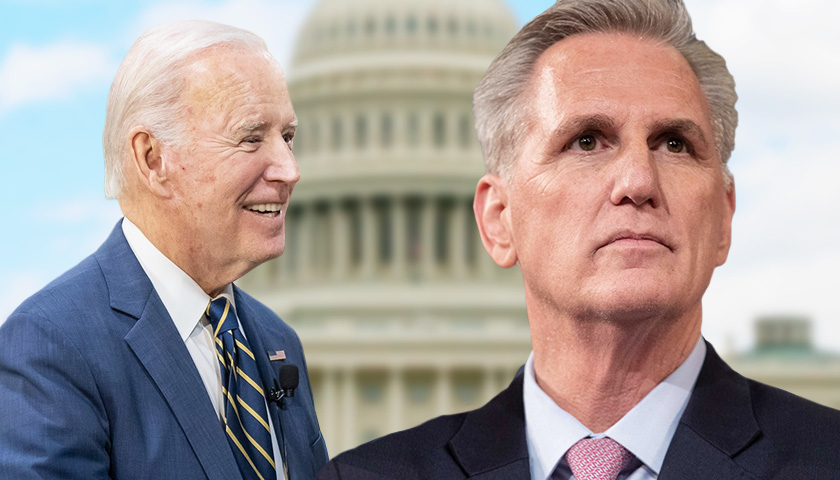by Bob Luddy
President Joe Biden and House Speaker Kevin McCarthy spent weeks of negotiating to authorize $4 trillion in new deficit spending over the next two years. This means that our national debt will be $35 trillion in 2025. The interest cost will be up to $1.4 trillion annually, only a small amount less than the current cost of national defense and Social Security combined. This staggering debt undermines the future prosperity of every American.
Federal spending contributes to a sense of entitlement, including for every person receiving federal largesse. Think of the adverse impact of federal student loans. President Barack Obama promised that government-granted student college loans would be more efficient, but these loans have, in fact, ballooned the cost of college. Concurrently, colleges have reduced quality outcomes and propagandized students, undermining our society because many students are hopelessly in debt. Now, progressives in Congress want to terminate the provision requiring repayment of student loans. For many of our young workforce, the burden of high student loans precludes marriage and buying a house.
The purported work requirements now have expanded exemptions, which probably means fewer recipients are working and explains why the workforce participation rate is declining — it is now 62.6 percent, compared to China’s 67 percent. America has 10 million unfilled jobs because the government pays too many individuals not to work or because they lack the skills required.
The propensity to spend by both political parties is overwhelming and continues to worsen. Since 2019, the federal budget has increased by 40 percent, but our GDP has only grown by about 10 percent. This agreement fails to rescind billions of unspent COVID funds that are no longer needed.
China, meanwhile, continues to invest in factories and technologies and is producing airplanes, weapons, and semiconductors. America remains heavily dependent on many sole-sourced products from China, which is hostile to our values and future.
In the United States, producers must gain permission from federal regulators to produce most products, including home dishwashers. Regulators are off work at 3:30 p.m., and many are already home because only about one-third of federal workers are at the office on any given day. Producers show up at the factory or office early and work hard.
Commercial dishwashers take one to three minutes each cycle while the federally regulated home dishwasher takes up to 90 minutes or more, for the purpose of saving energy. Every American knows that these regulations are counterproductive.
Last year, Congress passed the CHIPS and Science Act, allocating $52.7 billion to fund semiconductor factories. Added to this bill was another $227 billion for other dubious programs. This is a prime example of how Congress uses a hot-button issue to dramatically increase spending on aspirational projects. The restrictions and requirements on semiconductor manufacturers in the CHIPS Act will dramatically increase the cost of American-made chips (estimated at 50 percent higher) vs. Taiwan- and South Korean-made chips. America only produces about 12 percent of the semiconductors used in the United States.
Ludwig von Mises warned us many years ago that most-to-all government interventions fail, leading to more interventions. The COVID shutdown and endless spending that followed is a prime example of this theory.
The U.S. House has some courageous leaders, including Reps. Dan Bishop (R-N.C.) and Chip Roy (R-Texas). Seventy-one Republican congressmen voted no on this bill, which passed with 165 Democrat votes.
This debt-increase act misallocates scarce resources, allows government — not the economy — to grow, and creates a higher risk of a financial crisis.
The real cost of this debt-ceiling deal is slow economic growth and a lower standard of living for middle-class Americans, plagued by high taxes, regulation, and inflation.
– – –
Recognizing the demand for a quality manufacturer of commercial kitchen ventilation equipment, Bob Luddy purchased a sheet metal shop in 1981 and transformed it into CaptiveAire Systems. Today, CaptiveAire employs over 1,400 individuals, with 90 sales offices and six manufacturing facilities nationwide, and sales over $500 million in 2019. A strong advocate of excellent education, Bob establishes schools that help youth develop good character and reasoning skills. In 1998, Bob established Franklin Academy, a public charter school in Wake Forest, which now serves over 1,600 K-12 students. In 2001, Bob founded St. Thomas More Academy, a classical, college preparatory high school in Raleigh. In 2007, Bob opened Thales Academy, a network of private schools offering a high quality Pre-K-12 education at an affordable tuition. The Luddy Schools are quickly growing, with over 5,000 students enrolled throughout North Carolina, Tennessee, and Virginia. Bob is an avid supporter of entrepreneurs and the free market system, and published his book, “Entrepreneurial Life: The Path from Startup to Market Leader,” in 2018.
Photo “Kevin McCarthy” by Speaker Kevin McCarthy. Photo “Joe Biden” by President Joe Biden. Background Photo “U.S. Capitol” by Syed F Hashemi.








